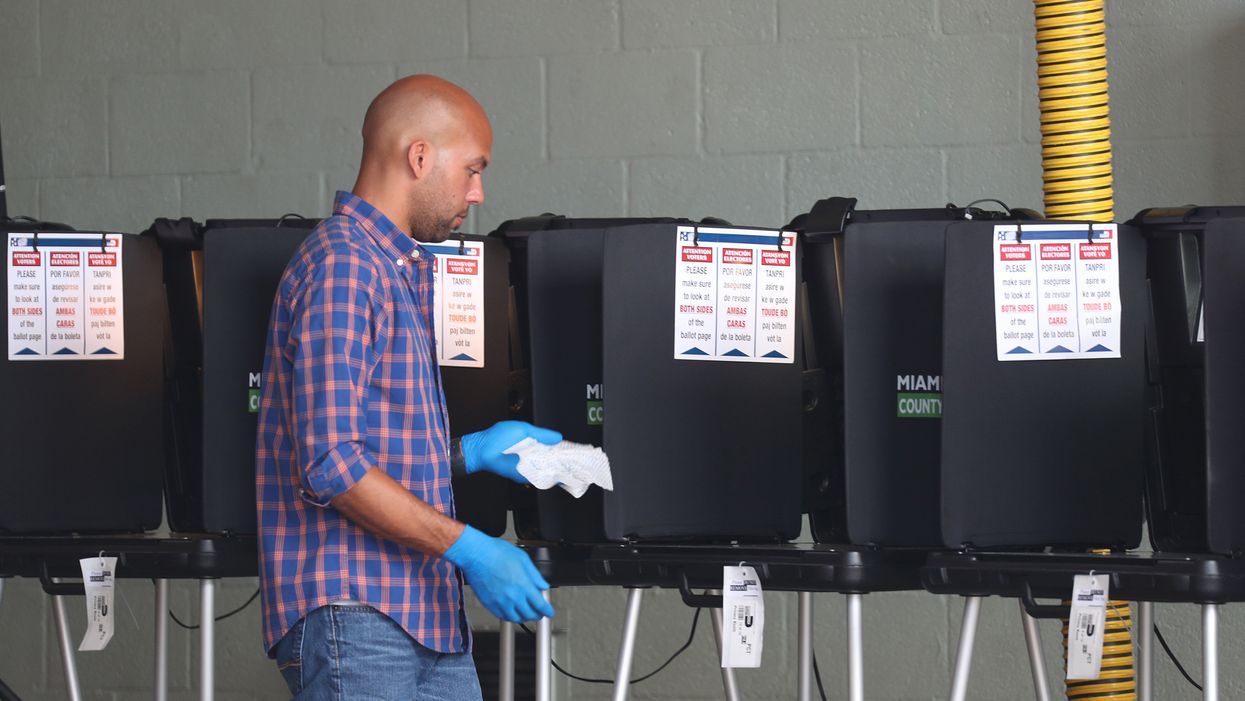Conservatives hoping to prevent private money from helping Americans vote have so far taken direct aim at just a couple of billionaires: Facebook chief executive Mark Zuckerberg and his wife, Priscilla Chan, who on Tuesday announced another $100 million in donations to help local governments conduct comprehensive and safe balloting in three weeks.
The donation follows their previous gift of $300 million, which has prompted lawsuits from the right in eight battleground states arguing that such benevolence should not be permitted to cover election administration costs.
But the Facebook philanthropists are among hundreds of business leaders who have stepped forward to help cash-strapped election officials scrambling to put enough poll workers, protective gear and infrastructure in place to avert chaos on Election Day. From the four dozen stadiums that sports leagues have opened as polling sites to the millions worth of face shields, masks and safety supplies donated to election workers by major corporations — the private sector's investment in this election is without precedent.
Business leaders say safeguarding the election is a matter of enlightened self-interest. "The headline for me is that this is about participation and not outcome," says Robert Kueppers, a trustee of the nonpartisan Committee for Economic Development, which has urged businesses to help the election with direct and indirect aid. "The underpinning of a full and fair election is good for the economy, and is therefore good for business."
Multiple private-sector coalitions — including the Operation Vote Safe initiative launched by Business for America, a coalition of corporate leaders interested in bettering democracy — have rushed in with masks, gloves, hand sanitizer and poll worker recruitment. In Georgia, Cox Enterprises donated 20 ballot drop boxes. In Pennsylvania, Ohio and Washington, Andersen Windows & Doors donated 25,000 face shields.
"I've never seen anything like this," says David Becker, executive director and founder of the Center for Election Innovation and Research, which has received $50 million in Zuckerberg money to distribute to states for voter education on logistics like how to obtain, fill out and return mail-in ballots.
The rest of Zuckerberg's first pledge, $250 million, went to the Center for Tech and Civic Life, a nonprofit that now faces the collection of lawsuits from the conservative Thomas More Society. The suits challenge grants the center has made to several cities — including Detroit, Minneapolis and Philadelphia, the biggest cities in three purple states — alleging that state legislatures must approve private federal election grants to local jurisdictions.
"This partisan privatization of our elections can't stand," Thomas More Society President Tom Brejcha said in a statement. A similar suit filed in Louisiana by GOP Attorney General Jeff Landry prompted local election officials there to drop their plans to accept Zuckerberg grants distributed by the center.
The Center for Tech and Civic Life has defended the private money as legal, calling the effort to block grants in Michigan, for one, "frivolous litigation" that "peddles disinformation." The Zuckerberg grants were made available nationwide, in both red and blue states and regions, and election law experts by and large agree that the money violates no laws and on balance should be applauded.
Congress approved $400 million for elections earlier this year, but it was a fraction of the $4 billion that New York University's Brennan Center for Justice said was needed, a number embraced by election administrators in red and blue states. Majority Republicans in the Senate and the Trump administration have resisted providing anything more during months of tortured negotiations over a pre-election coronavirus economic stimulus package, while majority Democrats in the House have voted to deliver the remaining $3.6 billion.
"Plan A should always be that government pays to provide the infrastructure for our democracy," says Becker, whose organization has not been sued. "But we are in unusual times right now. State budgets are particularly strained. Congress has refused to act. And it's not like we can delay the election."
Still, the role of private players in publicly administered elections raises thorny questions, and not just for conservatives. In New York, a progressive coalition that included Common Cause and the League of Women Voters, has called onDemocratic Gov. Andrew Cuomo to ensure that public funding, not Facebook money, underwrites the state's elections.
"Our view is that elections should be funded by the state instead of private interests," says Tom Speaker, a policy analyst at Reinvent Albany, one of five good-government groups that signed last month's letter. Private election funding raises the potential for interference or conflict of interest, he said, and "undermines public trust in the system."
It doesn't help that Facebook has served as a platform for disinformation, hate speech and foreign election interference, despite recent steps to curb abuses. Facebook's role "just makes what's already a bad story look even worse," says Speaker. But he acknowledges that the line between grants from Zuckerberg and in-kind contributions like drop boxes and face shields from corporations can be hazy.
Corporate executives are sometimes cast as the bogeyman in fights over protecting democracy, says Business for America CEO Sarah Bonk, but "feel they have a duty to preserve the system of government that allows them to create their business and operate in a market-driven system." Beyond protecting the election, Business for America is gearing up to support a full slate of popular democracy reforms, including anti- gerrymandering measures and ranked-choice voting.
Private-sector efforts to salvage the election are part of a larger movement toward corporate social responsibility, says Stephen D'Esposito, president and CEO of Resolve, a non-governmental organization that specializes in public-private partnerships. Resolve has joined with the bipartisan group VoteSafeand the Mission for Masks coalition to deliver up to $1 million worth of protective gear, including N-95 masks and plastic face shields, to voting super centers around the county.
"Let's just have a safe vote," says D'Esposito, "and then we can debate the constitutional issues later."
Carney is a contributing writer.




















Marco Rubio is the only adult left in the room